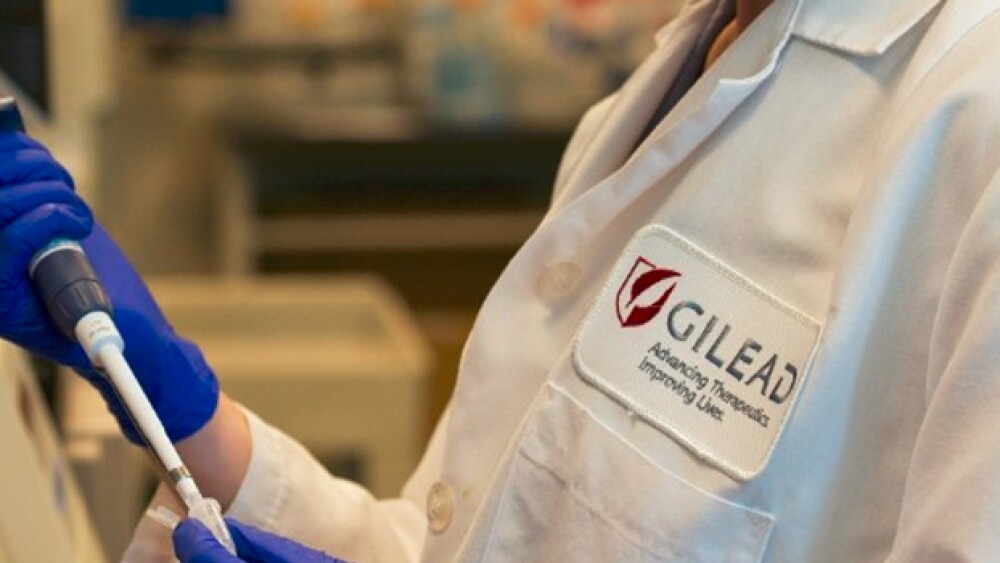Gilead Sciences, in two days, inked two collaboration deals with two different companies that could pay out an aggregate of more than $3.125 billion. One of those deals is in the area of immuno-oncology, the other in fibrosis.
Gilead Sciences, in two days, inked two collaboration deals with two different companies that could pay out an aggregate of more than $3.125 billion. One of those deals is in the area of immuno-oncology, the other in fibrosis.
Foster City, Calif.-based Gilead Sciences and Lexington, Mass.-based Agenus signed an immuno-oncology partnership to develop and commercialize up to five therapies.
Under the terms of the deal, Gilead will pay Agenus $150 million on closing, $120 million in cash and $30 million in equity investment. There are also about $1.7 billion in potential fees and milestone payments.
Gilead will hold worldwide exclusive rights to AGEN1423, which the companies expect will have an Investigational New Drug (IND) filing by the end of this year. Gilead also receives an exclusion option to license two more programs, AGEN1223 and AGEN2373. AGEN1223 already has an IND filed and AGEN2373 is expected to have an IND filed in the first half of 2019.
Garo Armen, Agenus’ chairman and chief executive officer, noted, “Gilead is an ideal partner for Agenus for the rapid advancement of our pipeline. By year end, our discovery platforms will have resulted in six INDs in 2018 and 13 INDs by the 1H2019.”
Agenus will take care of development up to defined option points, at which time Gilead can pick up exclusive rights to the programs. One of the option programs gives Agenus the right to opt in for shared development and commercialization in the U.S. Gilead also holds right of first negotiation for two more, undisclosed preclinical programs.
“Recent advances in immuno-oncology have produced unprecedented benefit to patients,” stated John McHutchison, Gilead’s chief scientific officer and head of Research and Development. “However, many people with cancer still require more effective treatment options. Our collaboration with Agenus gives us access to novel and differentiated immune modulating antibodies that will complement our growing oncology portfolio and cell therapy business.”
And yesterday, Gilead announced it had entered into a strategic collaboration with Cambridge, Mass.-based Scholar Rock Holding Corporation to discover and develop highly specific inhibitors of transforming growth factor beta activation for fibrotic diseases.
Fibrosis is an aspect of many diseases that causes scarring of tissues and organs. TGFb-driven signaling is believed to be a major regulator of fibrosis.
Gilead is paying Scholar Rock $80 million up front, made up of $50 million in cash and the acquisition of $30 million in common stock. Also, Scholar Rock will receive a one-time milestone payment of $25 million when it successfully completes specific preclinical studies. It may also be eligible to receive up to $1.425 billion in potential payments across all three programs based on various research, development, regulatory and commercialization milestones. Scholar Rock is also eligible for high single-digit to low double-digit tiered royalties on future product sales.
“Gilead’s commitment to developing innovative therapies for fibrotic diseases makes the company an ideal partner to maximize the value of candidates from our TGFb program,” stated Nagesh Mahanthappa, president and chief executive officer of Scholar Rock. “This collaboration also emphasizes our belief in the tremendous potential of Scholar Rock’s broad pipeline of highly specific modulators targeting the TGFb superfamily, with potential applications in a wide range of serious diseases, including neuromuscular disorders, cancer, fibrosis and anemia.”
Click here to see thousands of life science jobs on BioSpace’s job board.





